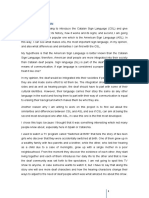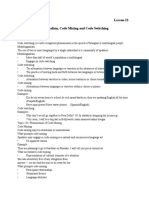Untitled
Untitled
Uploaded by
Nguyễn Thanh VânCopyright:
Available Formats
Untitled
Untitled
Uploaded by
Nguyễn Thanh VânCopyright
Available Formats
Share this document
Did you find this document useful?
Is this content inappropriate?
Copyright:
Available Formats
Untitled
Untitled
Uploaded by
Nguyễn Thanh VânCopyright:
Available Formats
TEST 3
Date:6/4/23
Mark the letter A, B, C or D on the answer sheet to indicate the word whose underlined part differs from the
other three in pronunciation in each of the following sentences.
Question 1: A. swing B. sword C. swallow D. sweet
Question 2: A. event B. lend C. even D. dentist
Question 3: A. eats B. signs C. sings D. gains
Question 4: A. missed B. laughed C. stopped D. closed
WORD STRESS
Question 5: A. corporation B. creation C. protection D. invention
Question 6: A. influence B. technology C. achievement D. security
Mark the letter A, B, C, or D on your answer sheet to indicate the correct answer to each of
the following questions.
Question 7: In most __________ developed countries, up to 50% of ________ population enters
higher education at some time in their lives.
A. the - 0 B. 0 - 0 C. the - a D. 0 - the
Question 8: The English were ___________ the first Europeans to settle _________ what is
now the United States.
A. of - at B. in - down C. out of – on D. among – in
Question 9: I gave him my compliments ________ his latest achievement in his career.
A. in B. on C. for D. from
Question 10: The progress made in computer technology ____________ the early 1960s has
been remarkable.
A. in B. for C. since D. during
Question 11: Extensive field study __________to confirm this new direction about animal
behavior.
A. required B. was being required C. was required D. have been requiring
Question 12: John, as well as his family, __________ to Washington twenty years ago.
A. move B. moves C. has been moved D. moved
Question 13: Common leisure activities won’t differ much from those of today in the _____
future.
A. see B. foresee C. foreseeable D. unforeseeable
Question 14: Washington, Adams, and Jefferson were _________ first American presidents.
A. a B. the C. an D. no article
Question 15: In spite of the fact that many efforts were meticulously made, the
patients____________ before the doctors arrived.
A. have died B. had died C. died D. had been died
Question 16: ___________ a reputable lawyer has always been his ambition.
A. To be B. To became C. To pursue D. To make
Question 17: ____________ twice, Fred had no excuse for the delay.
A. Though he has warned by the manager B. Been warning by the manager
C. Although the manager has warned D. Having been warned by the manager
Question 18: Of the two tests, this test is ________ worse than the last one.
A. by far B. much C. more D. far more
Question 19: There was unanimous agreement to support the flood victims in Middle
Vietnam ___________ philanthropists.
A. with B. between C. on D. among
Question 20: In all its history, this Army corps ___________ never lost a battle.
A. had B. were C. was D. has
Question 21: A: “Enjoy your weekend, John.”
B: “_______, Jane”
A. Yes B. You too
C. Me too D. I love them, too
Question 22: The new manager laid down very strict rules as soon as he had ____________ the
position.
A. taken up B. taken over C. taken off D. come over
Read the passage and choose one word or phrase marked A, B, C or D that best fits each of
the gaps:
Meeting old school friends again can be a strange experience. Some have changed so much that
you can hardly recognize them; they speak with a different (23) _______, are interested in
different things, and all you can do is to make (24) _______ talk and hope they’ll go soon.
Others, though you might have been out of (25) _______ with them for years, are just the same
as they always were – it’s (26) _______ if you last saw them yesterday. Before you know it,
you’re exchanging (27) _______ about your families and friends, and setting out the (28) ______
for another game of chess. A few change for the better. There’s one person that I get (29) ______
with very well now, though we weren’t on speaking (30) ______ for out last two years at school.
One day, we met at a party and made it up and got engaged the same evening.
Question 23: A. language B. accent C. way D. tongue
Question 24: A. small B. little C. silly D. gossip
Question 25: A. sight B. touch C. sound D. feel
Question 26: A. just B. like C. so D. as
Question 27: A. words B. talk C. gossip D. speech
Question 28: A. counters B. draughts C. squares D. pieces
Question 29: A. on B. off C. up D. down
Question 30: A. relations B. terms C. situation D. condition
Read the passage and choose the best answer.
In 1959, the government of Egypt was working on a plan to build a dam on the river Nile. It
was called the Aswan Dam, and it was intended to generate electricity and allow the river water
to be used for agriculture. There was one big problem with the plan, though. The dam would
flood a nearby valley that contained ancient Egyptian treasures, including two enormous stone
temples.
It can be difficult for governments to choose culture and history over economics. However, if
countries always made decisions like this, the majority of the world's ancient sites would end up
being destroyed. Luckily, UNESCO stepped in. They formed a committee that tried to convince
Egypt to protect its ancient treasures. With support from many countries, they were finally
successful. The huge temples were carefully removed from their original site and moved to a safe
location so that the dam could be built.
After their success in saving the temples in Egypt, UNESCO went on to save more sites around
the world. They protected lagoons in Venice, ruins in Pakistan, and temples in Indonesia. With
industrialization changing the world rapidly, there were many sites that needed to be saved.
Eventually, UNESCO formed the World Heritage Organization to protect important natural and
historic sites wherever it was necessary.
By now, the World Heritage Organization has protected hundreds of sites ranging from beautiful
natural islands to buildings in large cities and ancient ruins. If you're able to visit any of the
many protected sites, you'll agree it was worth it.
Question 31: What is the best title for the passage?
A. UNESCO B. UNESCO to succeed
C. UNESCO to develop D. UNESCO to rescue.
Question 32: The word “this” in paragraph 2 refers to ____________.
A. culture B. decision
C. country D. economics
Question 33: What is meant by the first sentence of the second paragraph?
A. Most governments prefer to sell their treasures.
B. Money sometimes seems more important than all other things.
C. Governments usually don't know anything about their culture.
D. Governments are never able to consider two things at once.
Question 34: Why did UNESCO get involved in Egypt?
A. Egypt was planning to build a valley for agriculture and electricity.
B. Egypt was planning to build a dam that would harm ancient temples.
C. Egypt was planning to create a dam right on top of an ancient temple.
D. When the dam flooded a valley, several treasures were discovered.
Question 35: Why is the World Heritage Organization more important now than it would have
been 200 years ago?
A. Countries didn't cooperate in the past.
B. There were not as many interesting sites 200 years ago.
C. Cities were smaller back then.
D. Modern business and production are changing the world.
Question 36: The word “They” in paragraph 3 refers to_______.
A. Decisions B. Countries
C. UNESCO D. Sites
Mark the letter A, B, C, or D on your answer sheet to indicate the word or phrase that is
OPPOSITE in meaning to the underlined part in each of the following questions.
Question 37: My cousin tends to look on the bright side in any circumstance.
A. be confident B. be pessimistic C be smart D. be optimistic
Question 38: My first impression of her was her impassive face
A. emotional B. fractious C. respectful D. solid
Mark the letter A, B, C, or D on your answer sheet to indicate the word or phrase that is
CLOSEST in meaning to the underlined part in each of the following questions.
Question 39: She was brought up in the slum of Lima, which is a very poor and crowded area.
A. towering skyscraper B. inner-city area C. coastal city D. high-rise building
Question 40: During the recession, many small companies were eradicated.
A. wiped out B. run out C. set up D. take over
Circle one option A, B, C or D that best rewrites each of the following sentences:
Question 41: Jennifer hadn’t expected the concert to be so good.
A. The concert was not good at all.
B. The concert was worse than Jennifer had expected.
C. Jennifer thought that the concert would be so good.
D. The concert was better than Jennifer had expected.
Question 42: The student next to me kept chewing gum. That bothered me a lot.
A. The student next to me kept chewing gum, that bothered me a lot.
B. The student next to me kept chewing gum, which bothered me a lot.
C. The student next to me kept chewing gum bothering me a lot.
D. The student next to me kept chewing gum bothered me a lot.
Question 43: Thanks to her high grades at university, she is offered the position.
A. If she had not got high grades at university, she would not be offered the position.
B. It was her high grades at university which offer her the position.
C. If she had not got high grades at university, she would not have been offered the position.
D. Without her high grades at university, she is not offered the position.
Question 44: "You'd better not lend Mark any more money, Elizabeth", said John.
A. Johns tells Elizabeth that she would better not lend Mark any more money.
B. Johns advised Elizabeth not to lend Mark any more money.
C. Johns advised Elizabeth that she had better not lend Mark any more money.
D. Johns said to Elizabeth that she would better lend Mark any money.
Question 45: Unless someone has a key, we cannot get into the house.
A. If someone does not have a key, we can only get into the house.
B. We could not get into the house if someone had a key.
C. We can only get into the house if someone has a key.
D. If someone did not have a key, we could not get into the house.
Question 46: Children enjoy telling and listening to ghosts stories, especially on
Halloween night.
A B C D
Question 47: We wish today is sunny so that we could spend the day in the country
communing with nature.
D A B C
Question 48: He is a handsome, intelligent, and friendly student in her school.
A B C D
Question 49: The hospital has asked various voluntary organizations to help raising money for
the new operating theater.
A B C D
You might also like
- Hungry Lightning - Notes of A Woman Anthropologist in Venezuela (PDFDrive)Document433 pagesHungry Lightning - Notes of A Woman Anthropologist in Venezuela (PDFDrive)Roger13No ratings yet
- đề cương toán 4Document5 pagesđề cương toán 4Nguyễn NgọcNo ratings yet
- ĐỀ SỐ 5Document4 pagesĐỀ SỐ 5Nguyễn Thu HuyềnNo ratings yet
- BT 30 Test 30Document7 pagesBT 30 Test 30TiffieNo ratings yet
- Đề MINH HỌA số 26 luyện thi Tốt Nghiệp THPT 2023Document7 pagesĐề MINH HỌA số 26 luyện thi Tốt Nghiệp THPT 2023Nhỏ SócNo ratings yet
- K8 - Final Term 2 - Test2Document4 pagesK8 - Final Term 2 - Test2hunghaycuoi83No ratings yet
- ĐỀ SỐ 9Document5 pagesĐỀ SỐ 9Anh MaiNo ratings yet
- Practice Tests 250521 ĐHDocument14 pagesPractice Tests 250521 ĐHTâm Trần0% (1)
- ĐỀ SỐ 9 - KEYDocument5 pagesĐỀ SỐ 9 - KEYAnh MaiNo ratings yet
- ĐỀ HSG 38 39 40Document8 pagesĐỀ HSG 38 39 40thanhhuyenleenaNo ratings yet
- Đề Số 5 Fast N Furious 5: (Đề thi có 05 trang) Đề có lời giảiDocument5 pagesĐề Số 5 Fast N Furious 5: (Đề thi có 05 trang) Đề có lời giảiNguyen Quoc DatNo ratings yet
- ĐỀ SỐ 1Document4 pagesĐỀ SỐ 1Hiếu NguyễnNo ratings yet
- (123doc) de Thi Thu THPT Quoc Gia Nam 2017 Mon Tieng Anh de 6Document6 pages(123doc) de Thi Thu THPT Quoc Gia Nam 2017 Mon Tieng Anh de 6Nghiêm Thúy TâmNo ratings yet
- L P 9 KC Ngày 17.4.2022Document3 pagesL P 9 KC Ngày 17.4.2022Sơn CôngNo ratings yet
- 12d3-Test 58Document18 pages12d3-Test 58nanavo2707No ratings yet
- Đề 24 - HSDocument5 pagesĐề 24 - HS03- Nguyễn Hoàng Ánh DươngNo ratings yet
- ĐỀ SỐ 7 - KEYDocument5 pagesĐỀ SỐ 7 - KEYAnh Mai100% (1)
- ĐỀ SỐ 23Document6 pagesĐỀ SỐ 23Anh MaiNo ratings yet
- Promise She Has MadeDocument6 pagesPromise She Has Madelam.qnhu23No ratings yet
- ĐỀ SỐ 7Document5 pagesĐỀ SỐ 7Anh MaiNo ratings yet
- Conventional Headphones Offer A Portable Alternative To Stationery Speakers. Alternative Conventional Stationery PortableDocument5 pagesConventional Headphones Offer A Portable Alternative To Stationery Speakers. Alternative Conventional Stationery Portablehoàn RicardoNo ratings yet
- Đề MINH HỌA số 04 luyện thi Tốt Nghiệp THPT 2022 làm btDocument6 pagesĐề MINH HỌA số 04 luyện thi Tốt Nghiệp THPT 2022 làm btThanh Thúy Vũ ThịNo ratings yet
- Mock Test 1Document5 pagesMock Test 1pabe94018No ratings yet
- ĐỀ SỐ 11 - KEYDocument5 pagesĐỀ SỐ 11 - KEYAnh MaiNo ratings yet
- Practice Test 9Document7 pagesPractice Test 9Quynh AnhNo ratings yet
- ĐỀ SỐ 11Document5 pagesĐỀ SỐ 11Anh MaiNo ratings yet
- De Thi Olympic Tieng Anh Lop 10 Nam Hoc 2018 2019 Truong THPT Nguyen TraiDocument10 pagesDe Thi Olympic Tieng Anh Lop 10 Nam Hoc 2018 2019 Truong THPT Nguyen Traiphung tu0% (1)
- ĐỀ HSG 43 44Document7 pagesĐỀ HSG 43 44thanhhuyenleenaNo ratings yet
- S Giáo D C Và Đào T o Hà N I Trư NG THPT Chuyên Hà N I-AmsterdamDocument4 pagesS Giáo D C Và Đào T o Hà N I Trư NG THPT Chuyên Hà N I-AmsterdamQuynh TrangNo ratings yet
- DoneDocument5 pagesDoneSav CouilNo ratings yet
- De Va Da On Thi THPT 2021 So 12Document8 pagesDe Va Da On Thi THPT 2021 So 12nguyen thi my nhungNo ratings yet
- Đề Chuẩn Tiếng Anh 2020 - Đề 8Document11 pagesĐề Chuẩn Tiếng Anh 2020 - Đề 8moonmood11906No ratings yet
- Chuyên Anh - 501Document6 pagesChuyên Anh - 501Hưng ChuNo ratings yet
- Vietnam's National Exam PracticeDocument7 pagesVietnam's National Exam PracticeThanh ThưNo ratings yet
- CCBook - Đề thi thử THPT QG năm 2020 - Môn Tiếng anh - Đề 19 (Có lời giải chi tiết)Document19 pagesCCBook - Đề thi thử THPT QG năm 2020 - Môn Tiếng anh - Đề 19 (Có lời giải chi tiết)K61 ĐỖ QUỲNH NGUYÊNNo ratings yet
- 7. Đề KSCL thi TN THPT lần 1 Sở GD Hà Tĩnh - có giải chi tiếtDocument16 pages7. Đề KSCL thi TN THPT lần 1 Sở GD Hà Tĩnh - có giải chi tiếtDương Thị YếnNo ratings yet
- Choose The Correct Answer To Each of The Following QuestionDocument7 pagesChoose The Correct Answer To Each of The Following QuestionLam Truong HoangNo ratings yet
- HS.30DEDAUDocument178 pagesHS.30DEDAUnhatquang0949No ratings yet
- ĐỀ 4 - ĐỀ MINH HỌA TNTHPT2024 BỘ GIÁO DỤC VÀ ĐÀO TẠODocument6 pagesĐỀ 4 - ĐỀ MINH HỌA TNTHPT2024 BỘ GIÁO DỤC VÀ ĐÀO TẠObuildsenpaihandsomeNo ratings yet
- MOCK TEST 4Document9 pagesMOCK TEST 4Phí BíchNo ratings yet
- Test 48Document8 pagesTest 48Hải Vũ ThịNo ratings yet
- Đề thi thử tốt nghiệp THPT Quốc Gia 2020 - Sở GD& ĐT Hà TĩnhDocument7 pagesĐề thi thử tốt nghiệp THPT Quốc Gia 2020 - Sở GD& ĐT Hà TĩnhThảo ĐàoNo ratings yet
- Đề thi thử THPT QG môn Anh trường THPT chuyên ĐH Vinh Nghệ An lần 3 năm 2019 có lời giải chi tiếtDocument25 pagesĐề thi thử THPT QG môn Anh trường THPT chuyên ĐH Vinh Nghệ An lần 3 năm 2019 có lời giải chi tiếtJennifer WatsonNo ratings yet
- ĐỀ ÔN THI TNPT -ĐỀ 1 -5 (NGA)Document58 pagesĐỀ ÔN THI TNPT -ĐỀ 1 -5 (NGA)Trung Vũ ThànhNo ratings yet
- Test 19-2024Document4 pagesTest 19-2024vungochuyen.mmn20219No ratings yet
- Đề MINH HỌA số 24 luyện thi Tốt Nghiệp THPT 2023Document6 pagesĐề MINH HỌA số 24 luyện thi Tốt Nghiệp THPT 2023jungkookjoen900No ratings yet
- ĐA ĐỀ 132 (VIP 31)Document17 pagesĐA ĐỀ 132 (VIP 31)thanhnam2982005No ratings yet
- 12 ĐỀ TIẾNG ANHDocument50 pages12 ĐỀ TIẾNG ANHnguyenhaiannh06No ratings yet
- De 3Document17 pagesDe 3Nguyễn Thị Trà My100% (1)
- ÔN TẬP GHKII - ĐỀ 1Document5 pagesÔN TẬP GHKII - ĐỀ 1Tri VoNo ratings yet
- 28 Đề Tháng 1 - 2022 Final (12-1,2,4,6)Document141 pages28 Đề Tháng 1 - 2022 Final (12-1,2,4,6)Bảo Ngọc NguyễnNo ratings yet
- ĐỀ SỐ 36Document5 pagesĐỀ SỐ 36saigongiasu96No ratings yet
- 12A8-9 Wed PracTest12 NokeyDocument4 pages12A8-9 Wed PracTest12 NokeyMai Hương NguyễnNo ratings yet
- ĐỀ PHÁT TRIỂN TỪ ĐỀ MINH HỌA SỐ 48-50Document12 pagesĐỀ PHÁT TRIỂN TỪ ĐỀ MINH HỌA SỐ 48-50Nguyễn DanhNo ratings yet
- ĐỀ VIP 36 0- PHÁT TRIỂN ĐỀ MINH HỌA THAM KHẢO BGD MÔN ANH NĂM 2024 (NC12)Document23 pagesĐỀ VIP 36 0- PHÁT TRIỂN ĐỀ MINH HỌA THAM KHẢO BGD MÔN ANH NĂM 2024 (NC12)dangtrung3546No ratings yet
- ĐỀ THI TỐT NGHIỆP THPT 2022 ĐỀ 1 20Document120 pagesĐỀ THI TỐT NGHIỆP THPT 2022 ĐỀ 1 20Nguyễn Cẩm TúNo ratings yet
- ĐỀ SỐ 12Document5 pagesĐỀ SỐ 12Đạt Nguyễn QuốcNo ratings yet
- Đề số 01 luyện thi Tốt Nghiệp THPT 2022Document7 pagesĐề số 01 luyện thi Tốt Nghiệp THPT 2022Ngân NguyễnNo ratings yet
- Đề thi thử THPT Lần 1Document5 pagesĐề thi thử THPT Lần 1quynhchii2209No ratings yet
- Unit 2 - Daily ActivityDocument5 pagesUnit 2 - Daily ActivitySari MarthaNo ratings yet
- Ayat Aktif Kepada Ayat PasifDocument4 pagesAyat Aktif Kepada Ayat PasifYahya Farid KamaluddinNo ratings yet
- 2023 Excel Calendar With Holidays 09Document23 pages2023 Excel Calendar With Holidays 09Jan Peter PiliNo ratings yet
- UntitledDocument59 pagesUntitledkaoutarNo ratings yet
- "Deconstructing Psycho Killer Clowns" (Chapter, THE PYROTECHNIC INSANITARIUM, Mark Dery)Document27 pages"Deconstructing Psycho Killer Clowns" (Chapter, THE PYROTECHNIC INSANITARIUM, Mark Dery)Mark Dery100% (3)
- Materi Mata Pelajaran (Bahasa Inggris)Document10 pagesMateri Mata Pelajaran (Bahasa Inggris)Syakir R. N.No ratings yet
- Lidkar Samudaya Bavana GFDocument1 pageLidkar Samudaya Bavana GFchandru shekarNo ratings yet
- Direct MethodDocument3 pagesDirect MethodTerrazas Ramirez AlexanderNo ratings yet
- Government of Karnataka O/o Commissioner For Public Instruction, Nrupatunga Road, Bangalore - 560001Document43 pagesGovernment of Karnataka O/o Commissioner For Public Instruction, Nrupatunga Road, Bangalore - 560001Seenu HkNo ratings yet
- Grade 9 Standard Indicators: Legend: F (Strand) (Standard) G9/ (Indicator)Document1 pageGrade 9 Standard Indicators: Legend: F (Strand) (Standard) G9/ (Indicator)JC Santos100% (1)
- Go Billy Korean Episode 91Document4 pagesGo Billy Korean Episode 91Shanay GilbertNo ratings yet
- Blue Whale Company IntroductionDocument39 pagesBlue Whale Company IntroductionRoo VidNo ratings yet
- Week 5 Cross Cultural Communication PDFDocument52 pagesWeek 5 Cross Cultural Communication PDFYassine MerizakNo ratings yet
- 1st Sem BA Sanskrit QPDocument12 pages1st Sem BA Sanskrit QPSameera DSNo ratings yet
- English For PeaceDocument12 pagesEnglish For PeaceAmani SalmanNo ratings yet
- Sopa de LetrasDocument2 pagesSopa de LetrasLuisa Fernanda ArboledaNo ratings yet
- Let's Celebrate Diversity!: Pepe Santa CruzDocument4 pagesLet's Celebrate Diversity!: Pepe Santa Cruzrrr12100% (2)
- Eng506 Handouts Lec 23-45Document84 pagesEng506 Handouts Lec 23-45Dil AwerNo ratings yet
- Baquilala, Fujiko Rio T. (Bio Data)Document2 pagesBaquilala, Fujiko Rio T. (Bio Data)fujikoNo ratings yet
- Work-With-Diverse-People AnswersDocument17 pagesWork-With-Diverse-People AnswersJaspreet kaurNo ratings yet
- What Does He Say About Playing For The National Team?Document17 pagesWhat Does He Say About Playing For The National Team?AlmiraNo ratings yet
- Lang Ans FinalDocument1 pageLang Ans FinalJheanelle Andrea GodoyNo ratings yet
- 483-Article Text-674-1-10-20200603Document11 pages483-Article Text-674-1-10-20200603Dennyse DiazNo ratings yet
- Standards in Native English and Nigeria ContextDocument42 pagesStandards in Native English and Nigeria ContextEnyichukwu NwaigweNo ratings yet
- Soal Ujian Bhs Inggris Xi GanjilDocument8 pagesSoal Ujian Bhs Inggris Xi GanjilYosafat NapaulunNo ratings yet
- Kitsch in Sync: A Consumer's Guide To Bad Taste - Peter WardDocument129 pagesKitsch in Sync: A Consumer's Guide To Bad Taste - Peter Wardqwerty2100% (2)
- Africans in IndiaDocument17 pagesAfricans in IndiaDEVASHISH CHAKRAVARTYNo ratings yet
- Reflected Ceiling GFDocument1 pageReflected Ceiling GFjerico darlucioNo ratings yet
- McKenley Umd 0117N 18710Document104 pagesMcKenley Umd 0117N 18710joshniNo ratings yet

























































































